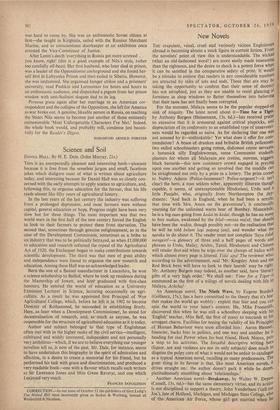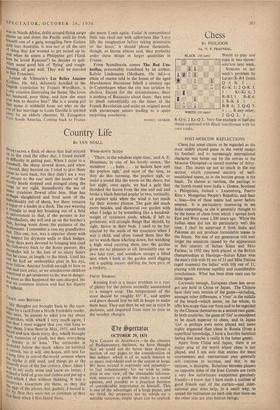New Novels
Tun crapulent, venal, cruel and variously vicious Englishman abroad is becoming almost a stock figure in current fiction. From the novelists' point of view this is understandable. The wicked (what an old-fashioned word!) are more easily made interesting than the righteous, and the desire to shock is a potent force when it can be satisfied in the comparative safety of print. It would be a mistake to assume that readers in any considerable numbers are attracted by tales of sots and sods. Those that are may be taking the opportunity to confirm that their sense of decereY has not atrophied, just as they are unable to resist glancing at furniture in shop windows to flatter themselves into believing that their.taste has not finally been corrupted.
For the moment, Malaya seems to be the popular stopped-UP sink of iniquity. The latest novel about it—Time for a Tiger, by Anthony Burgess (Heinemann, 13s. 6d.}—has received praise so excessive that it is armoured against critical pinpricks, a 'd depreciation of its conformity to an established type of unsavouri- ness would be regarded as naive. As for declaring that one was as not amused by it—unthinkable! Yet what does it offer for corn. mendation? A brace of drunken and bribable British policemen two exiled schoolmasters going rotten, dishonest comic servants, a homesick silly Englishwoman, some Communist students, planters for whom all Malayans ,are cretins, morons, niggers, black bastards—this now customary crowd engaged in preying upon one another and getting so involved that the muddle can be straightened out only by a prize in a lottery. The prize comes to Nabby Adams (Police-lieutenant? Police-sergeant?—it in clear) the hero, a man seldom sober, apparently illiterate though capable, it seems, of unexceptionable Hindustani, Urdu and a little Punjabi, who, originally from Northampton (he day' dreams: `And back in England, when he had been a sextcn that time with Mrs. Amos on the gravestone'), is continua IY yearning for the unlimited warm beer of Bombay. Meanwhile, he is a big tuan going from kedai to kedai, though he has no wa ig to buy makan, awakened by the bilal—minta ma'af, that should have been the waktu, though possibly not—to the realisation that he will be told 'whim lagi pegang janji, and wonder what the naraka to do about it. The reader must not complain `Saya tid k mengerti'—a glossary of three and a half pages of words and phrases in Urdu, Malay, Arabic, Tamil, Hindustani and Chinese will render first-aid when he trips over the clumps of italics with which almost every page is littered. Tida' apa! The reviewer who, according to the advertisement, said `Mr. Kingsley Amis and the Red Brick boys will have to look to their laurels' may 'be right. Mr. Anthony Burgess may indeed, as another said, have literarY gifts of a very high order.' We shall see: Time for a Tiger is announced as the first of a trilogy of novels dealing with life in Malaya. Achcha! An American novel, The Ninth Wave, by Eugene Burdick (Gollancz, 15s.), has a hero committed to the theory that it's fed that makes the world go wobbly : exploit that fear and you colt spin the world to your heart's content. He, Mike Freest-Pith, discovered this when he was still a schoolboy sleeping with his 'English' teacher, Miss Bell, the first of many to succumb to 1 is arrogant charm. Facilities for testing the validity of his Principles of Human Behaviour were soon afforded him : Aaron Blenng r, financier, backs him in politics, and one way and another he is heading for real Power when his best friend, Hank Moore, puts a stop to his activities. The forceful descriptive writing here (liquor, sex and violence are not its only subjects) does much to disguise the pulpy core of what it would not be unfair to catalogue as a typical American novel, recalling so many predecessors. The great thing in its favour is that, like most American novels, it drives straight on : the author doesn't park it while he dozes, platitudinously mumbling about 'relationships.'
Another American novel—Breakaway, by Walter W. Depov' (Cassell, 13s. 6d.)—has the same elementary virtue, and its action is not disciplined to support a theory. John Vanderham ('call 1110 Joe'), late of Holland, Michigan, and Michigan State College, also of the American Air Force, whose girl got married when. he Was in North Africa, drifts around flying cargo Planes up and down the Pacific until he finds himself, one of a gang smuggling. New Guinea. Cold into Australia. It was not at all the, sort "T thing that Joe wanted to get mixed up in Land when he meets a Philippine girl ("God. how he loved Ramona!) he decides to quit. After some good bits of 'flying' and rough- !InitSing,, all goes well. They. will be married in San Francisco. Louise de Vilmorin's Les Belles Amours (Collins, 10s. 6d.), delicately handled in the English translation by Francis Wyndham.. is ,a chic creation illustrating the theme 'She loves ner husband, poor thing, and how she must love him to deceive him!' She is a young. girl !her name is withheld from us) who on the eve of her marriage to Louis Duville is Spirited Iway by an elderly charmer, M. Zaraguirre 11 South America. Coming back to France she meets Louis again. Voila! A conventional little tale eked out with aphorisms like'Love fills the imagination before taking pcissession of the heart,' it should please thousands. though, as Sterne almost said, they probably order these things in larger quantities in France.
From Scandinavia comes The Red Urn. brellas, presumably translated by its author, Kelvin Lindemann (Methuen, 10s. 6d.)—a chain of stories told in the house of the aged Marchioness Hermione Schell a century ago in Copenhagen when the city was stricken by cholera. Except for the circumstances, there is nothing of Boccaccio about them : they tend to dwell romantically on the times of the French Revolution and make an original novel with picturesque scenes leading to a quite surprising conclusion.
DANIEL' GEORGE.











































 Previous page
Previous page